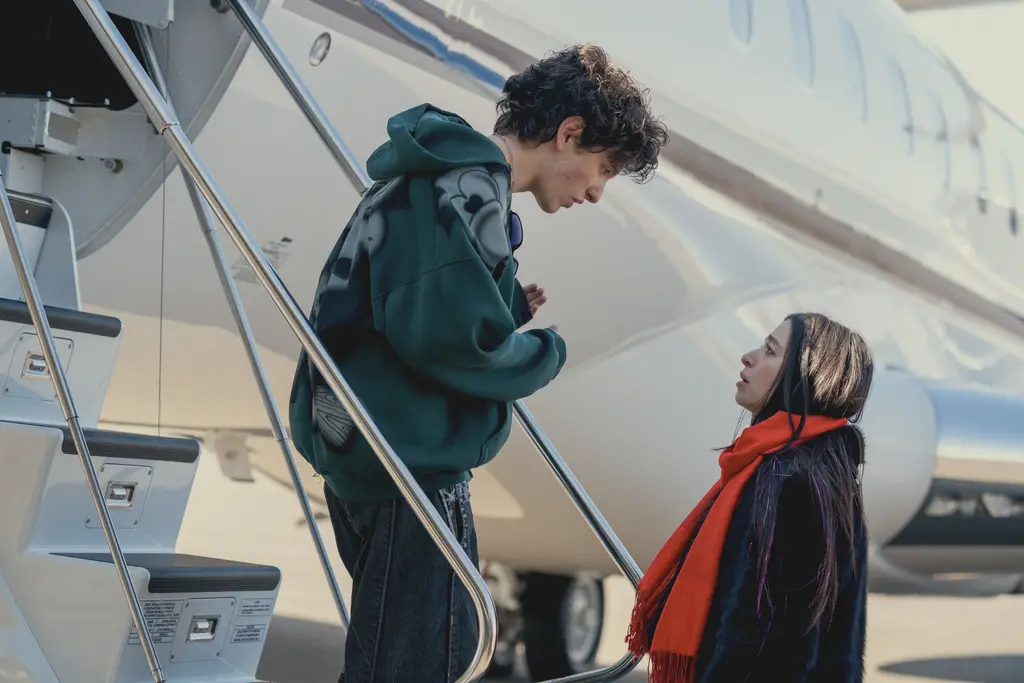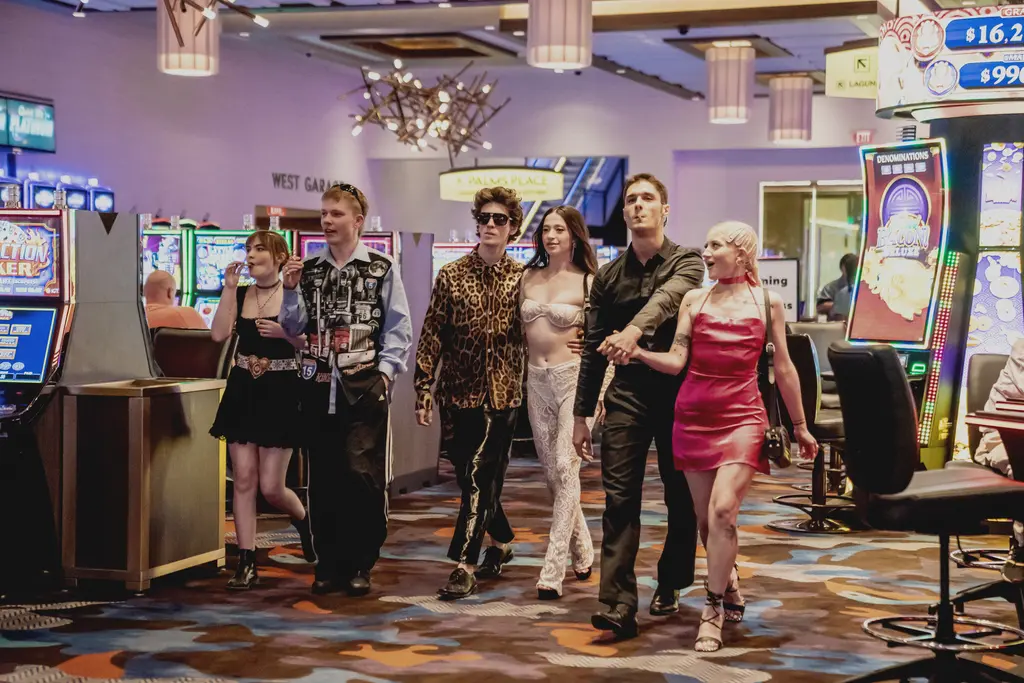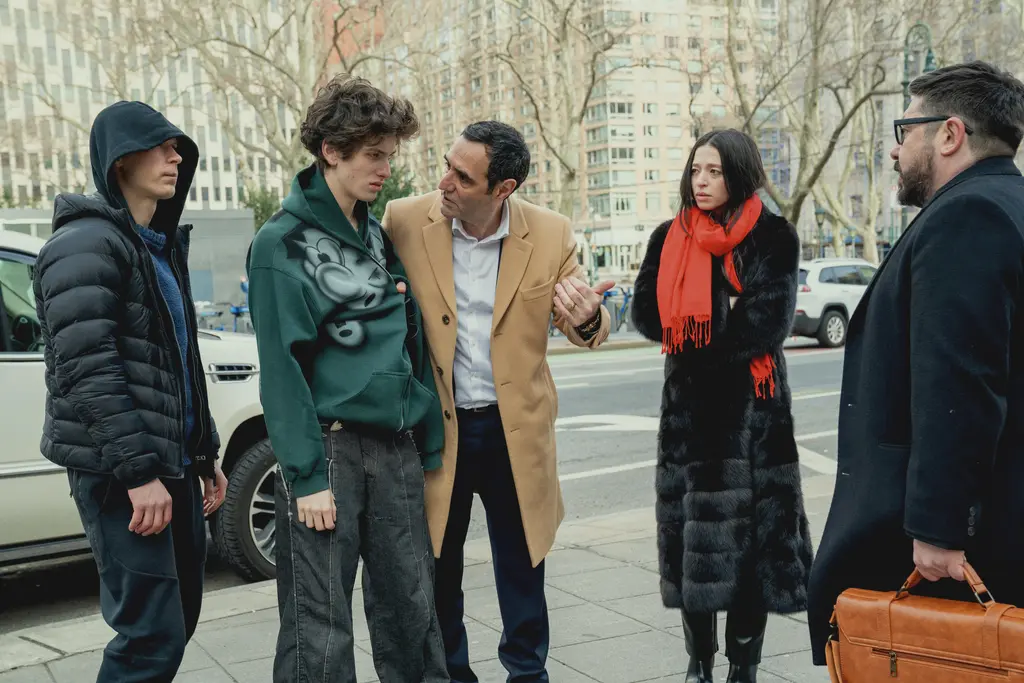Is Anora the best film of the year?

We certainly think so. Sean Baker’s rollicking, Palme d’Or-winning, Mikey Madison-starring film is the wildest of rides – the actor and director tell us all about it.
Culture
Words: Jade Wickes
When director Sean Baker went to see the Scream reboot in 2022, he walked out with one thing in his head: Mikey Madison, who plays Amber Freeman and (spoiler alert) Ghostface in the film, would be the star of his next project.
A few phone calls later, Mikey (who had a supporting role as a Manson Family member in Quentin Tarantino’s Once Upon a Time in Hollywood and was in Pamela Adlon’s brilliant FX comedy series Better Things) was on board – that is, without a script having even been written yet. And so the journey to making Anora began.
It’s probably best to go and watch it knowing as little as possible, but just so you’ve got somewhat of an idea: the titular Anora (or Ani, as she prefers to be called) is played with delicious vim by Madison in this modern fairytale gone awry-meets-supreme screwball comedy.
Ani’s a sex worker living in Brooklyn, and she’s really good at her job; Vanya, a young, dumb and – literally – full of cum Russian oligarch’s son (Mark Eydelshteyn) thinks so too. So much so that he asks her to marry him. Ani, charmed by Vanya’s compulsive spending habits and general joie de vivre, agrees.
What follows is a rollercoaster that’s equal parts wrenching and hysterical, as told in a manner that feels so lived in that the events of the film might as well be happening in your living room – even though much of it takes place in Coney Island, a location that is practically its own beast in Anora.
Baker is good at this kind of filmmaking: his previous works Red Rocket (about a disenfranchised porn star), Tangerine (about a trans sex worker in Los Angeles) and The Florida Project (about a single mum who uses sex work to support herself and her daughter), are all about people whose lives unfold on the margins. Over the years, he’s ingratiated himself in their worlds, as they, in turn, have become an integral part of his filmmaking.
Anora is no different. In fact, it adds to another through line that’s so often present in his work: the transactional nature of human relationships, here conjured with the most frenetic, teeth-clenching of energies. Out in UK cinemas today, we sat down with Sean and Mikey during last month’s London Film Festival to ask them all about it.
Hi Mikey, hi Sean! What were the most challenging and rewarding things about making Anora?
Mikey: It was [as] rewarding and challenging, as any movie should [be]. I did a lot of difficult things in preparation for the character, both physically and mentally. I learned Russian. Ani goes through so much, so it felt necessary for [all of that] to feel hard.
Sean: We were trying to go for a balance of different tones, which was the most challenging thing – not only in terms of performance but also style, furious versus comedic. But I had an incredible cast who understood that; everybody was on the same page about those tonal shifts. They knew when to be big and broad in their comedy and then when to keep it reality-based. The most rewarding thing, of course, was winning the Palme d’Or [at Cannes].
Mikey, Ani does a lot of screaming in this film. Was it quite strenuous?
M: I didn’t do any vocal prep, if that’s what you mean – I don’t often find myself screaming, so I wasn’t sure how it was going to come out, or how it would feel. But behind the scenes, I’d jump up and down, run around, run up to my room. Sean would be like, “What are you doing up there?” Yuriy [Borisov, who plays a bodyguard] and I would just look at each other to get into a scene. It depended on the day.
How did you decompress from the role?
M: I don’t think I really decompressed while we were filming. I found myself in a similar headspace [Ani] was in. I didn’t quite realise this until towards the end, but I was being quite guarded and protective of myself, not very outwardly emotional [like she is]. I’ve never quite had that shared experience with a character before in terms of my emotions.



The film feels very naturalistic. Was any of it improvised?
S: It was heavily scripted. Any improv was based on the existing dialogue. But there were some set pieces in which I had to rely entirely on improvisation, especially at the beginning of the film, where we were setting up the mechanics of the club, and what a day and night in the life of Ani looked like. Mikey had done so much research – shadowing dancers, spending time in the club, really getting to understand these interactions and transactions. I basically shot her walking around a live club and improvising in those moments. It was incredible.
What have you both learned about yourself over the course of making Anora?
M: I’ve learned a lot – about myself as an actor and personally. I’ve learned to trust my instincts, how important my voice is, creating a character; how far I was able to push myself out of my comfort zone in a way that I’ve never done before. Making this movie was a very impactful and transformative experience.
S: I learned a lot of things, too. I think my approach to my next film will be different – this is the first time that my entire main cast were seasoned professionals. I’ve loved my experiences in the past, working with non-professionals and first-timers, those are great experiences. But this time around was so different. These actors’ level of experience, their skill, their craft, all brought so much to the table and elevated everything that I had on the page. I really love that – I think I’m going to continue that.
Who would win in a fight, Ani or Vanya’s mum?
M: I think that Vanya’s mum is slightly physically stronger than Ani, but Ani is scrappy and she fights hard, so they’d both put up a pretty good fight.
S: I’m going to say it’d be a draw.




